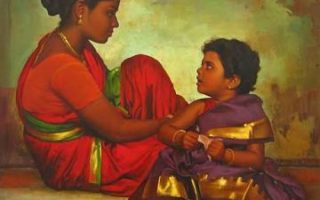Published on Reach Magazine Vol 1
Written by Sanju Ganesan, TYOUK member
Waging a national liberation struggle to secure the political aspirations of a people is not a new phenomenon. The national liberation struggle to secure the democratic rights of the Tamils in Sri Lanka started even before the country’s independence from British rule. The continuous oppression of the Tamils’ and the denial of their political aspirations by successive Sinhala governments forced the Tamils to broaden their struggle from demanding equal rights in the country to demanding the right to self determination. Discrimination and state sponsored violence on Tamils were used as a tactic by successive Sinhala governments to win the Sinhala votes in the South of the country. Discrimination, Sinhala colonisation of the Tamil homeland, militarisation and crimes of genocide forced the Tamil political leaders to decide that it would not be possible to find a solution in a unitary Sri Lanka.
 Tamil political leaders attempted to defend the rights of Tamils in Sri Lanka. G.G Ponnambalam, the founder of All Ceylon Tamil Congress (ACTC) in 1939, put the ‘Fifty – Fifty’ (Balance Representation) concept forward. This demanded 50% of the parliamentary seats for Sinhalese and 50% for Tamils and other communities. This proposal was rejected by both Sinhala politicians and the British Governor. Sri Lanka gained independence in 1947 with the Soulbury Constitution.
Tamil political leaders attempted to defend the rights of Tamils in Sri Lanka. G.G Ponnambalam, the founder of All Ceylon Tamil Congress (ACTC) in 1939, put the ‘Fifty – Fifty’ (Balance Representation) concept forward. This demanded 50% of the parliamentary seats for Sinhalese and 50% for Tamils and other communities. This proposal was rejected by both Sinhala politicians and the British Governor. Sri Lanka gained independence in 1947 with the Soulbury Constitution.
In the 1956 election S.W.R.D. Bandaranaike introduced the ‘Sinhala Only’ act to win the Sinhala votes. S.W.R.D won the election, within a week of his appointment, he passed the ‘Sinhala Only’ act, and this marginalised the opportunity for Tamils in the society. The Federal Party led S J V Chelvanayakam, took a strong stand against the ‘Sinhala Only’ act and the ‘Citizenship’ act, which removed the citizenship rights of the upcountry Tamils. The Federal Party launched a Satyagraha (non violent) campaign, the government attacked this and state sponsored riots took the lives of 300 Tamils. The ‘Bandaranaike – Chelvanayakam’ pact signed in 1957 was a result of the violence that had erupted. However the pressure received from the ruling party members made Bandaranaike withdraw from the agreement.
Dudley Senanayake was the second prime minister of Sri Lanka to form a pact due to the continuous political pressure put by Tamils, again the ‘Dudley – Chelvanayakam’ pact was never implemented. Sirimavo R.D. Bandaranaike in 1960 stood on an election platform to continue the discriminatory policies against Tamils in Sri Lanka in order to win the election. As a result of her victory she introduced policies, which provided the Sinhalese with better positions in education and public sector jobs.
The Federal Party again took a firm stand against the discrimination of Tamils. The Federal Party concise of the deteriorating situation for Tamils in the country started to intensify mobilisation of Tamils to campaign for Tamil rights. Despite the non-violent resistance, the Sinhala government continued to oppress the Tamils. The continuous rejection of the democratic rights, government sponsored riots and genocidal attacks on Tamils forced the Federal party to demand for a separate Tamil homeland, Tamil Eelam.

In 1975, two strong Tamil political parties merged with the Federal Party to form the Tamil United Liberation Front (TULF). TULF adopted the ‘Vaddukoddai Resolution’ in 1976 this encouraged the Tamil youth to step forward and work for the separate state of Tamil Eelam to fulfill the political aspirations of the Tamils. In the 1977 elections, TULF’s manifesto pledged, “to establish an independent sovereign, secular, socialist State of Tamil Eelam…” In the election TULF won in the North and East with a majority and they became the largest opposition in the parliament. The strength of the TULF in the parliament brought the Sinhala government to negotiate. After serious dialogue the ‘District Development Council Scheme’ was proposed. Again history repeated itself and the scheme was never implemented.
The Sixth Amendment passes in 1983; this prohibited the advocacy for the right to self-determination. TULF members rejected this bill; many had been thrown out of parliamentary positions for not taking the oath on the Sixth Amendment. The continuous Tamil political struggle rooted the state sponsored attack on Tamils in 1983 ‘Black July’, more than 3000 Tamils were killed and 300,000 displaced. State sponsored violence against the Tamil political demands added fuel to the armed struggle.
The Indo – Lanka accord signed by the J. R. Jayewardene – Sri Lankan government and India, agreed the devolution of power to provincial councils. This agreement did not fulfill the political aspiration of the Tamils and the Tamils rejected it. Although this agreement did not fulfill the demands of the Tamils, the opposition campaigned against the government because of the Indo-Lanka pact. J.N. Dixit, Indian High Commissioner during the period of Indo – Lanka agreement had made the attitude of Sinhala government clear with the following statement “the attempts at genuine mediation and finding a solution made by India between 1983 and 1990 was sabotaged primarily by members of the Sri Lankan Government” Ranasinghe Premadasa (United National Party) succeeded J. R. Jayewardene, soon after the victory he asked the Indian Peace Keeping Force to leave the country. He promised India a political solution for Tamils but nothing was implemented.

In 2002, The Cease Fire Agreement (CFA) signed by the Liberation Tigers of Tamil Eelam representing the Tamil people and the Sri Lankan government was facilitated by Norway. The international community failed to pressure the Sri Lankan government to recognise the Tamil people’s grievances and the political talks failed. The Interim Self Governing Authority (ISGA) proposed by the LTTE, which was welcomed by the international community had also been rejected by the Sri Lankan government. Thereafter, the Sri Lankan government had withdrawn from the CFA and started the war.
In 2009, the Sri Lankan government ignored the call for ceasefire to reduce the civilian casualty; the international community failed to take meaningful action against the Sri Lankan government and ignored the pleas of the Tamils and human rights activists around the world. The actions of successive Sri Lankan governments have simply demonstrated that the political aspirations of the Tamils will not be recognised by the Sri Lankan state.
Today, Tamil political parties and students continue the political struggle whilst at the gunpoint of the military. Students, civil rights activists and politicians who have stood against the oppression, militarisation, land grab process and Sinhala colonisation have been brutally attacked.
Students in Tamil Eelam have clearly expressed to the world that the fight for self-determination is not over and it will never end until justice is served. State sponsored genocide will not stop the power of resistance and the demand for self-determination; rather it will increase the thirst for Tamil Eelam.
The uprising of the Tamil Nadu students has given a new strength and paradigm to the Tamil liberation struggle, and has given a voice to the Eelam Tamils who continue to be victims of genocide, to continue their fight for justice.
It is important for the diaspora youth to understand that the struggle for self-determination has been taking place for over 65 years. Historical events have made it clear that all previous attempts to secure a solution to the Tamil national question with successive Sri Lankan governments have failed as the Sri Lankan state continues to insist a unitary framework and rejects the sovereignty of the Eelam Tamil nation, which historically existed. The diaspora plays a key role in voicing the political aspirations of the Eelam Tamils. The freedom of speech, which we enjoy, enables us to advocate for Tamil Eelam, we are not restricted like our brothers and sisters living in our homeland. Therefore we should uncompromisingly demonstrate our political aspirations of a separate state of Tamil Eelam as the only solution for Tamils. We should continue to advocate for the justice for all of the victims affected by the ongoing genocide and fight for the creation of Tamil Eelam through a UN monitored referendum without compromising on our nation, sovereignty and right to self-determination.



